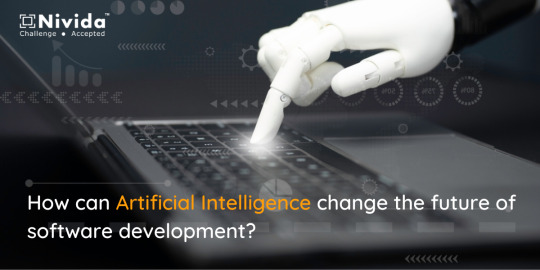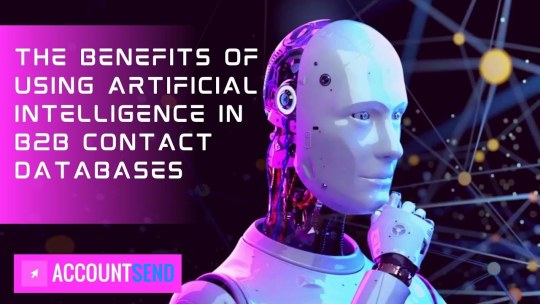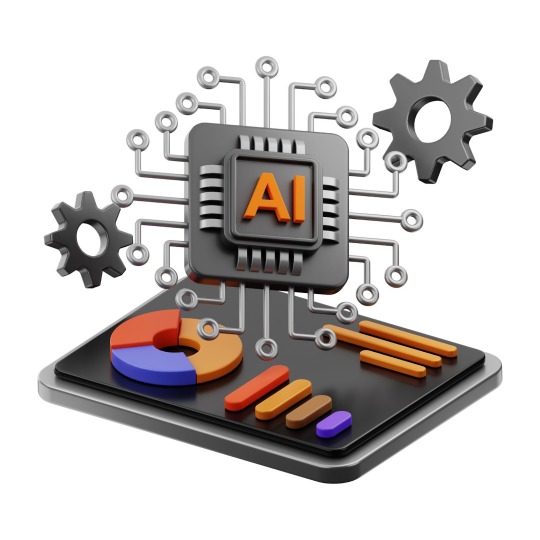#AI-enhanced data analytics
Explore tagged Tumblr posts
Text
THE ROLE OF ARTIFICIAL INTELLIGENCE IN SOFTWARE DEVELOPMENT
Artificial Intelligence (AI) is rapidly transforming the software development industry. From automating mundane tasks to providing intelligent insights, AI is revolutionizing the way developers design, test, and deploy software applications. In this article, we will explore the role of AI in software development, and how it is transforming the industry.

1. Automating Development Processes:
AI is being used to automate a variety of development processes such as coding, testing, debugging, and deployment. By automating these tasks, developers can save a significant amount of time and effort, which can be redirected towards more critical tasks like designing and improving the software. AI-powered development tools like AutoML, code completion tools, and intelligent testing tools are helping developers to write efficient, clean, and secure code, thereby reducing the time to market and improving the overall quality of the software.
2. Predictive Analysis:
AI-powered predictive analytics tools can analyze large volumes of data to provide insights into potential issues before they occur. By analyzing user behavior and identifying patterns, developers can predict potential problems, and address them before they occur. For example, predictive analytics tools can identify areas of the code that are prone to bugs, and suggest changes that can prevent those bugs from occurring in the future.
3. Natural Language Processing:
Natural Language Processing (NLP) is a branch of AI that deals with the interaction between human language and machines. NLP-powered software can understand and interpret human language, making it possible to create more user-friendly software applications. NLP is being used in software development to build chatbots, voice assistants, and other conversational interfaces that can interact with users in a more natural and intuitive way.
4. Enhancing User Experience:
AI is being used to enhance the user experience of software applications. By analyzing user behavior and preferences, AI-powered software can personalize the user experience, making it more engaging and intuitive. For example, AI-powered recommender systems can suggest products or services based on a user's previous behavior, improving the chances of a sale.
5. Intelligent Decision Making:
AI is being used to make intelligent decisions in software development. By analyzing data and identifying patterns, AI-powered systems can make informed decisions about the software development process, such as which features to prioritize, how to optimize the software for performance, and which bugs to fix first. By making informed decisions, AI-powered systems can help developers to build more efficient, secure, and reliable software applications.
6. Cybersecurity:
AI is being used to enhance cybersecurity in software development. By analyzing network traffic and identifying potential threats, AI-powered systems can detect and prevent cyber attacks before they occur. AI-powered security tools can also analyze user behavior to identify anomalies that may indicate a potential security breach.
In conclusion, AI is transforming the software development industry by automating mundane tasks, providing predictive insights, enhancing the user experience, making intelligent decisions, and improving cybersecurity. As AI continues to evolve, we can expect to see even more exciting developments in the field of software development.
#SEO#digital marketing#branding#social media marketing#business#online marketing#content marketing#search engine optimization#digital marketing agency#marketing strategy#instagram advertising#email marketing#digital marketing tips#digital marketing training#digital marketing consultant#digital marketing expert#digital marketing services#digital marketing plan#digital marketingcompany#digital marketing solutions#digital marketing business
7 notes
·
View notes
Text
5 tips for web marketing in 2023
How to do web marketing in 2023? In the New Year, web marketing awaits, characterized by the increasingly massive use of artificial intelligence, which helps to help the marketer create content. However, contrary to what many think, it is sure that technology can never completely replace the person with his characteristics, such as empathy and involvement.

So let's see the five useful tips for successful digital marketing in 2023 in this blog dedicated to the world of the Web!
The importance of data-driven predictive analytics
This is the so-called forecast for advertising, which becomes fundamental in the daily activity of those who do marketing. In this case, powerful mathematical models guide business decisions and advertising investments, discovering new developments and potential. However, today only 51% of companies have access to a single database related to the business, and few understand how profitable it is to streamline data acquisition to offer customers personalized experiences.
The importance of investing in customer service
In 2022 there was a lot of talk about the end of the funnel, and in this sense, HubSpot indicates, among the trends of 2023, the need to use the archetype of the flywheel. Today, the end of the funnel is customer service, which enables the company to grow through word of mouth. For this reason, planning listening and dialogue activities with those who choose the company to become fundamental.
Communicating your values: a fundamental element of web marketing in 2023
Web marketing in 2023 means having the ability to communicate the company's values. Only the communication of your values allows you to create a deep connection with customers. In this case, content marketing plays a fundamental role in communicating corporate social responsibility.

Personalize the user experience
74% of surfers do not like browsing non-personalized pages, and those who have been able to offer the user a personalized experience have seen a 19% increase in sales. In this case, you can rely on AI and algorithms to create a personalized landing page based on previous searches and user tastes. Of course, the best user experience must also and, above all, be guaranteed by mobile.
Work with an integrated strategy
Web marketing in 2023 is characterized by an integrated strategy and a multi-channel user experience, which puts those involved in Strategy, Advertising, UX and Data analysis side by side in order to enhance information and data, using them effectively.
In conclusion, these are the five trends that will characterize web marketing in 2023, trends that no company can ignore if it wants to be successful online.
15 notes
·
View notes
Text
What is ERP Software and How it helps in the Manufacturing Industry?
What is ERP Software?
ERP (Enterprise Resource Planning) software is a type of software used by businesses to manage and integrate core business processes such as finance, HR, procurement, supply chain, and customer relationship management. The goal of ERP is to provide a single unified view of data across an organization to help streamline and optimize operations.

Shanti Technology is one of the most popular ERP software companies in Surat. Solutions offered by Shanti technology are one-of-a-kind and specially designed ERP software for engineering companies that follow the fashion in which people work today. It focuses on strategic IT Initiatives. These solutions maximize the availability of the systems or processes and reduce the risks as well.
Why is ERP Software used in Manufacturing Industries?
As a language model AI, I don't have personal experience but here's why:
Improved Visibility: Manufacturing industries can access real-time data from across their operations with the help of ERP software, leading to improved visibility and control over the entire production process.
Increased Efficiency: ERP software streamlines and automates many of the manual tasks involved in production, reducing the time and effort required to complete these tasks. This results in increased efficiency and improved productivity.
Enhanced Inventory Management: ERP software enables manufacturers to track inventory levels in real-time, ensuring that they have the materials they need to keep their operations running smoothly.
Better Planning and Scheduling: ERP software helps manufacturers to plan and schedule production runs more effectively, reducing the risk of bottlenecks and downtime.
Improved Cost Control: By providing a comprehensive view of all costs associated with production, ERP software enables manufacturers to identify areas where they can reduce costs and improve their bottom line.
Better Collaboration: ERP software enables different departments within a manufacturing company to work together more effectively, improving communication and collaboration throughout the organization.
Integration with Other Systems: ERP software can be integrated with other systems, such as CRM, accounting software, and supply chain management systems, providing manufacturers with a single source of truth and a more streamlined process.
Shanti Technology is one of the most popular ERP software companies in Surat. Solutions offered by Shanti technology are one-of-a-kind and specially designed ERP software for engineering companies that follow the fashion in which people work today. It focuses on strategic IT Initiatives. These solutions maximize the availability of the systems or processes and reduce the risks as well.
Benefits of ERP software for Manufacturing Industries
Increased efficiency: ERP software streamlines processes, reducing manual work and speeding up production times.
Improved data management: Manufacturing industries often collect and manage a lot of data. ERP software allows for more accurate, organized, and accessible data storage and analysis.
Better inventory management: ERP software tracks inventory levels, automates reordering, and helps ensure production schedules aren’t impacted by stock shortages.
Enhanced collaboration: ERP software integrates data across departments, allowing for better communication and collaboration between teams.
Increased accuracy: ERP software minimizes human error, allowing for a more accurate record of information, such as production data and inventory levels.
Better decision-making: ERP software provides real-time data and analytics that support informed decision-making for production, purchasing, and sales.
Better supply chain management: ERP software provides visibility into the entire supply chain, allowing for better tracking, communication, and coordination between suppliers and production teams.
Reduced costs: By streamlining processes and reducing manual work, ERP software can reduce costs associated with production, inventory management, and supply chain management.
Shanti Technology is one of the most popular ERP software companies in Surat. Solutions offered by Shanti technology are one-of-a-kind and specially designed ERP software for engineering companies that follow the fashion in which people work today. It focuses on strategic IT Initiatives. These solutions maximize the availability of the systems or processes and reduce the risks as well.
ERP software represents the next generation in business software. While basic, functional ERPs have been around since the 1980s, these systems are now evolving to meet the needs of modern businesses. The best ERP systems today allow businesses to leverage information and process data in real-time rather than waiting for periodic reporting periods; they also enable a unified view of business data to promote clear decision-making processes, and they are cloud-based, allowing companies to save money on expensive hardware upgrades.
Shanti Technology is one of the most popular ERP software companies in Surat. Solutions offered by Shanti technology are one-of-a-kind and specially designed ERP software for engineering companies that follow the fashion in which people work today. It focuses on strategic IT Initiatives. These solutions maximize the availability of the systems or processes and reduce the risks as well.
#ERP software Companies in India#ERP software for engineering company#ERP software Companies in Surat#ERP Software Companies in Mumbai | Pune | Bhopal | Surat | Rajkot - STERP
7 notes
·
View notes
Text
The Benefits of Using Artificial Intelligence in B2B Contact Databases
Article by Jonathan Bomser | CEO | AccountSend.com

The advent of artificial intelligence (AI) has transformed various aspects of business, and B2B contact databases are no exception. By integrating AI with these databases, businesses can achieve remarkable improvements in efficiency, accuracy, and lead generation. Here are some of the compelling benefits of using AI in B2B contact databases.
DOWNLOAD THE ARTIFICIAL INTELLIGENCE INFOGRAPHIC HERE
Improved Data Accuracy
AI algorithms can analyze vast amounts of contact data and identify errors, inconsistencies, or duplicates. By eliminating these inaccuracies, AI ensures your sales outreach is directed to valid and relevant B2B leads, thereby improving the success rate of your campaigns.
Enhanced Lead Scoring
AI can help in creating a more precise lead scoring model. By analyzing historical data and identifying patterns, AI can predict which prospects are more likely to convert into customers. This allows sales teams to prioritize their efforts on high-value leads, improving the sales pipeline and overall sales efficiency.
Advanced Market Segmentation
AI can analyze data to identify trends, patterns, and correlations that might be missed by human analysis. This ability can lead to advanced market segmentation, helping businesses identify niche industries, emerging markets, and untapped sales opportunities.
Streamlined CRM Integration
AI can enhance the functionality of your CRM system. By intelligently integrating your B2B contact database with your CRM, AI can automate data entry, update records, and provide insightful analytics. This can save time and resources while providing a more comprehensive view of your customers.

Predictive Analytics for Sales Forecasting
AI's predictive analytics capabilities can provide valuable insights for sales forecasting. By analyzing past data and trends, AI can predict future sales opportunities, helping businesses to plan their marketing strategy more effectively.
Personalized Marketing Campaigns
AI can personalize marketing campaigns based on the data from your contact database. It can analyze a prospect's behavior, interests, and preferences to craft personalized messages, thereby enhancing your email marketing and account-based marketing efforts.
24/7 Availability for Global Business Expansion
AI systems can operate around the clock, making them ideal for global business expansion. AI can manage and update your B2B contact database in real-time, ensuring you have accurate and up-to-date data at all times, irrespective of time zones.
In conclusion, integrating AI with B2B contact databases can provide significant benefits, from improving data accuracy and lead scoring to personalizing marketing campaigns and aiding global expansion. As AI continues to evolve, its influence on B2B data management and marketing strategies is set to increase, marking a transformative shift in the way businesses operate.
#businessowners#businessadvisors#ceos#businesstips#businessstrategy#businessgrowth#entrepreneurship#b2b#accountsend
3 notes
·
View notes
Text
The Rise of Insurance Virtual Assistants - Transforming Customer Experience

In today's fast-paced digital era, industries across the board are embracing technological advancements to enhance their services and streamline operations. The insurance industry, too, is undergoing a major transformation with the emergence of insurance virtual assistants. These intelligent virtual assistants are revolutionizing the way insurance companies interact with their customers, offering personalized assistance, improving efficiency, and delivering a seamless customer experience. In this blog, we will delve into the world of virtual assistants and explore how they are reshaping the insurance landscape.
What is an Insurance Virtual Assistant? An insurance virtual assistant is an AI-powered chatbot or voice-activated assistant designed to assist customers with their insurance-related queries and transactions. These virtual assistants are equipped with natural language processing (NLP) capabilities, machine learning algorithms, and vast amounts of data to provide accurate information and personalized support to policyholders.
Personalized Customer Engagement One of the key advantages of insurance virtual assistants is their ability to offer personalized customer engagement. By analyzing customer data and past interactions, virtual assistants can provide tailored recommendations and relevant information to policyholders. Whether it's explaining policy details, helping with claims processing, or offering personalized insurance quotes, these virtual assistants can deliver a highly customized experience to each customer.
24/7 Availability and Instantaneous Responses Insurance virtual assistants are available round the clock, providing customers with instant support whenever they need it. Whether it's a query about coverage, premium payments, or policy renewal, customers can interact with the virtual assistant at any time, eliminating the need to wait for business hours or speak to a human representative. The quick and efficient responses from virtual assistants ensure a smoother customer experience and help in building trust and loyalty.
Streamlined Claims Processing Traditionally, the claims process in insurance companies has been time-consuming and complex. Insurance virtual assistants have revolutionized this aspect by simplifying and expediting claims processing. Customers can file claims, track their status, and get updates on their settlement through the virtual assistant. The integration of AI and machine learning algorithms allows virtual assistants to understand the nature of the claim, gather required information, and provide customers with real-time updates, reducing the manual effort and time taken in traditional claim handling.
Enhancing Efficiency and Cost Savings By automating routine tasks and providing self-service options, insurance virtual assistants free up human agents to focus on more complex and specialized tasks. This significantly improves operational efficiency and reduces costs for insurance companies. Virtual assistants can handle a large volume of customer inquiries simultaneously, ensuring faster response times and reducing the need for additional customer service personnel.
Data-driven Insights and Analytics Insurance virtual assistants generate a vast amount of data from customer interactions. This data can be leveraged to gain valuable insights into customer behavior, preferences, and pain points. Insurance companies can utilize these insights to enhance their products, refine their customer service strategies, and identify opportunities for cross-selling or upselling. By continuously learning from customer interactions, virtual assistants can adapt and improve their responses over time, further enhancing the customer experience.
The advent of insurance virtual assistants has transformed the way insurance companies engage with their customers. These intelligent and responsive virtual assistants provide personalized support, streamline claims processing, and offer 24/7 availability.
2 notes
·
View notes
Text
Personalized Learning through the Magic of Artificial Intelligence (AI)

Introduction
The incorporation of Artificial Intelligence (AI) into many facets of our lives in recent years has fundamentally changed how we learn, and education is no different. For students of all ages, personalized learning combined with AI technology has emerged as a potent tool for improving the educational experience. AI-powered personalized learning has the ability to transform education and realize every student's potential by adapting instruction to individual requirements, aptitudes, and learning preferences.
What is Personalized Learning?
The goal of personalized learning is to adapt instruction to the unique requirements, skills, and interests of each learner. It recognizes that every learner is different and progresses at their own rate. With personalized learning, students may move through the material at the pace that works best for them, with information and activities that are tailored to their particular goals and learning preferences.
Let’s explore the significant role Artificial Intelligence (AI) plays in personalized learning and its impact on education.
Individualized Instruction
The ability of AI to deliver individualized instruction is one of the major advantages of personalized learning. To design personalized learning pathways, AI-powered platforms and algorithms analyze enormous volumes of data on students' learning patterns, preferences, and performance. AI systems can suggest the best learning resources, activities, and instructional methodologies by evaluating each student's skills, weaknesses, and learning preferences. This makes sure that students receive specialized education that is suited to their particular needs and that they are able to learn at their own speed.
Adaptive Learning
Artificial Intelligence (AI) offers adaptive learning environments, which change the content and teaching as needed based on how well the learner is doing. AI systems can pinpoint areas in which learners are having difficulty and offer extra support or other strategies through continual assessment and analysis. This flexibility makes sure that students get the correct amount of assistance and challenge, avoiding boredom or dissatisfaction. Systems for adaptive learning powered by AI assist students in concentrating on their areas of greatest need, leading to a deeper knowledge and concepts mastery.
Intelligent Tutoring
Intelligent tutoring systems that use AI serve as virtual tutors for students, offering them individualized advice and feedback. For conversational interactions with students, these systems combine machine learning techniques and natural language processing. AI instructors can provide fast feedback, clarify concepts, and offer pointers or extra examples by analyzing students' responses and identifying their misconceptions. Intelligent tutoring systems allow for individualized help and scaffolding for learners, encouraging self-directed learning and problem-solving abilities.
Data-Driven Insights
In personalized learning, Artificial Intelligence (AI) creates a lot of data about students' learning behaviors, advancements, and results. Educators can use this information to discover important information about the patterns of individual and group learning. Educators can discover areas in which learners are having difficulty, modify their instructional tactics, and decide on interventions or curriculum changes by analyzing this data. Analytics technologies driven by AI give educators immediate feedback, allowing them to track students' progress and modify their instruction as necessary.
Enhanced Engagement and Motivation
AI-powered personalized learning experiences have the potential to raise student motivation and engagement. AI systems cater to the interests, preferences, and aspirations of students by providing specialized information and activities. AI-powered platforms can incorporate gamification components like prizes, badges, and progress monitoring to make learning more engaging and fun. Additionally, AI Systems' rapid feedback and tailored coaching can give students more confidence and motivate them to participate actively in their education.
By utilizing its skills to analyze data, deliver individualized teaching, and produce adaptive learning experiences, AI has completely transformed personalized learning. The potential of every learner can be unlocked, and each student's needs may be met through customized training using AI technologies, according to educators. In addition to offering personalized content, Artificial Intelligence (AI) in personalized learning also provides intelligent support, adaptive feedback, and data-driven insights that improve student motivation, engagement, and learning results. The incorporation of AI in education will surely transform the future of learning as technology develops, enabling students to realize their full potential in a personalized and adaptive way.
Benefits of Personalized Learning with Artificial Intelligence (AI):
Flexible Learning Paths
Each learner has a different learning rate and style. Students are able to move through the curriculum at their own pace thanks to personalized learning using AI. AI algorithms can determine the best learning path for every student, adding more resources or changing the content to address any areas where they may be having difficulty. Due to their ability to take their time and fully study each idea before moving on, learners develop a deeper understanding of the material.
Real-Time Feedback and Assessment
Real-time feedback and assessment are another important benefit of personalized learning with AI. AI systems can track learners' development, assess their performance, and spot areas where they might need further help. Students can evaluate their own understanding, make mistakes, and solidify their learning thanks to the rapid feedback. Additionally, real-time data access allows teachers to quickly identify difficult pupils, provide fast interventions, and modify their curriculum as necessary.
Personalized Support for Special Needs
For students who have specific needs, personalized learning enabled by AI has the power to completely change their educational experience. AI algorithms can vary the pace of instruction, adjust the content, and offer additional support to fit the specific needs of these students by analyzing their individual strengths, weaknesses, and learning preferences. This individualized help promotes inclusivity and gives learners with special needs the tools they need to overcome obstacles and succeed in their studies.
Targeted Support
Artificial intelligence (AI) systems monitor student performance and offer focused assistance where needed. AI systems assist students overcome obstacles and strengthen their grasp of subjects by providing personalized feedback and advice, which improves learning results.
Accessibility
Anytime, everywhere learning is made possible through personalized AI learning. Students now have greater freedom in their study routines because of the availability of educational resources and materials online. Additionally, AI can adjust to individual needs and take into account varied learning styles, making education more accessible to students of all backgrounds.
Conclusion
By adapting training to each learner's specific needs, personalized learning with Artificial Intelligence (AI) has the potential to revolutionize education. AI-powered personalized learning helps students reach their maximum potential by offering individualized education, flexible learning paths, increased engagement, real-time feedback, and personalized assistance. Additionally, the data produced by AI algorithms enables educators to make data-driven decisions, enhancing the learning process all around. Personalized learning will become more efficient as AI develops, enabling students to become lifelong learners in a quickly changing environment.
2 notes
·
View notes
Text
Exciting News: Key Topics for CMOs!
🔙 Reflecting on the past, as Senior Marketing Leaders with over 30 years of experience, we've witnessed pivotal industry changes. From data-driven strategies to social media's rise, our journey has evolved. Today, three essential topics demand our attention.
🔎 In the present, CMOs must prioritise:
1️⃣ Customer Experience: Delivering exceptional experiences across touchpoints is crucial in this customer-centric era. Understanding needs, personalisation, and fostering loyalty are vital for success.
2️⃣ Data & Analytics: Data fuels marketing decisions. CMOs must leverage analytics to gain insights, optimise campaigns, and drive growth. An analytical mindset and actionable intelligence extraction are key.
3️⃣ Digital Transformation: Embracing digital is vital. AI, automation, and robust strategies shape success. CMOs must lead digital initiatives to stay relevant and connect with tech-savvy consumers.
🚀 Looking ahead, three trends will shape marketing's future:
1️⃣ Purpose-Driven Marketing: Consumers seek brands with values and impact. CMOs must drive purpose, focusing on sustainability and social responsibility, to build loyalty.
2️⃣ AI & Personalisation: AI revolutionises customer engagement. CMOs should use AI for personalised experiences, hyper-targeting, and predictive analytics, enhancing efficiency and tailored interactions.
3️⃣ Omnichannel Marketing: Seamlessly integrating online and offline experiences is vital. CMOs must ensure consistency and continuity across touchpoints for a cohesive brand experience.
🌟 Adapting to these significant topics is crucial for CMOs.
Let's shape the future together! we'd love to connect with fellow marketing leaders and industry professionals who share these passions.
Thanks, and letsrocc! https://www.letsrocc.com
2 notes
·
View notes
Text
AI Sales Enablement: Enhancing the Customer Experience
In today's rapidly evolving business landscape, artificial intelligence (AI) has emerged as a transformative force, revolutionizing various industries, including sales and marketing. AI sales enablement, in particular, has become a powerful tool for organizations to optimize their sales processes and enhance customer experiences. By leveraging AI technologies, businesses can gather valuable insights, personalize interactions, and streamline sales efforts. This blog post explores AI sales enablement from a customer perspective, highlighting the benefits it brings to customers and how it shapes the modern buying journey.

1. Personalized Interactions:
One of the significant advantages AI sales enablement offers from a customer perspective is the ability to provide personalized interactions throughout the buying journey. Traditional sales methods often rely on generic approaches, where customers receive similar pitches and offers regardless of their unique needs. However, AI-powered solutions can analyze vast amounts of customer data, enabling organizations to understand individual preferences, pain points, and buying patterns.
With AI, businesses can deliver highly tailored recommendations, product suggestions, and offers based on each customer's specific requirements. By leveraging machine learning algorithms, AI sales enablement tools can learn from previous interactions and continuously refine their recommendations. This personalized approach fosters a deeper connection between customers and businesses, leading to increased satisfaction and loyalty.
2. Enhanced Customer Insights
AI sales enablement solutions also empower organizations to gain comprehensive insights into their customers, enabling them to understand their preferences and behavior better. By analyzing vast amounts of customer data, AI algorithms can identify trends, patterns, and correlations that might go unnoticed
These insights enable businesses to segment their customer base effectively, identifying different customer personas and targeting them with customized marketing strategies. With AI-powered analytics, organizations can determine the best time to engage with customers, the most effective channels for communication, and the type of content that resonates most with their target audience. As a result, businesses can allocate their resources more efficiently, ensuring that their sales efforts are focused on the right customers with the highest potential for conversion.
3. Streamlined Buying Journey
The modern customer expects a seamless and convenient buying experience. AI sales enablement tools can significantly contribute to streamlining the buying journey, making it easier and more efficient for customers to make informed purchasing decisions. By implementing AI chatbots, businesses can provide round-the-clock assistance, answering customer queries and guiding them through the sales process.
AI-powered chatbots can handle routine inquiries, provide product recommendations, and even assist with complex decision-making. These virtual assistants simulate human-like interactions, creating a more engaging and personalized experience for customers. Moreover, AI algorithms can analyze customer behavior in real-time, enabling organizations to proactively address potential issues, anticipate customer needs, and provide timely support.
4. Improved Customer Satisfaction and Retention
Ultimately, AI sales enablement solutions contribute to improved customer satisfaction and increased retention rates. By personalizing interactions, providing valuable insights, and streamlining the buying journey, businesses can cater to customer needs more effectively. Satisfied customers are more likely to become loyal advocates, promoting the brand through positive word-of-mouth and repeat purchases.
AI-powered solutions also enable businesses to anticipate and address customer pain points proactively. By leveraging sentiment analysis and customer feedback, organizations can identify areas of improvement and fine-tune their sales strategies accordingly. This continuous feedback loop ensures that customers feel valued, leading to higher levels of satisfaction and loyalty.
AI sales enablement has revolutionized the way businesses interact with customers, focusing on personalized experiences, insightful analytics, and streamlined processes. From the customer perspective, AI-driven sales enablement tools offer personalized interactions, enhanced customer insights, a streamlined buying journey, and improved satisfaction and retention. By leveraging the power of AI, organizations can create meaningful connections with their customers, understand their needs on a deeper level, and deliver a seamless buying experience that exceeds expectations.
As AI technologies continue to advance, the future of sales enablement holds even greater potential for customer-centricity. Voice-activated AI assistants, for instance, are becoming more prevalent, allowing customers to interact with brands through natural language conversations. This technology enables customers to ask questions, seek recommendations, and receive real-time assistance, creating a more interactive and personalized experience.
Furthermore, AI-powered predictive analytics can anticipate customer needs before they even arise. By analyzing historical data, market trends, and customer behavior, businesses can proactively suggest products or services that align with customers' preferences. This proactive approach not only saves time but also demonstrates a deep understanding of the customer, enhancing their overall satisfaction.
AI sales enablement also has the capacity to improve the post-sales experience. Chatbots and virtual assistants can provide ongoing support, offering product tutorials, troubleshooting assistance, and order tracking information. These AI-driven solutions ensure that customers receive prompt and accurate responses, reducing the need for lengthy wait times and frustration. As a result, customers feel valued and supported, fostering long-term loyalty.
However, it's important to note that while AI sales enablement brings numerous benefits, it should complement rather than replace human interactions. The human touch is still vital in building trust, empathy, and understanding. Therefore, organizations should strike a balance between AI-driven automation and human expertise to deliver exceptional customer experiences.
In conclusion, AI sales enablement has transformed the customer experience by personalizing interactions, providing deep insights, streamlining the buying journey, and improving satisfaction and retention rates. From tailored recommendations to proactive support, AI technologies empower businesses to meet and exceed customer expectations at every touchpoint. By embracing AI sales enablement from a customer perspective, organizations can forge stronger connections, drive customer loyalty, and stay ahead in the competitive marketplace of the future.
2 notes
·
View notes
Text
The Power of Software Development: Transforming Ideas into Reality
Introduction: Software development is the driving force behind technological innovation in our digital age. From mobile applications to enterprise systems, software development has the power to transform ideas into functional and impactful solutions. In this short blog, we will explore the significance of software development and its ability to shape our modern world.
Solving Real-World Problems: Software development enables us to address real-world challenges and improve efficiency across various industries. For instance, in the healthcare sector, software solutions have revolutionized patient management systems, electronic health records, and telemedicine platforms, enhancing the quality and accessibility of healthcare services. Similarly, in the transportation industry, software plays a crucial role in logistics optimization, route planning, and driver management, leading to cost savings and improved delivery times.
Enhancing User Experiences: Well-designed software applications can significantly enhance user experiences. Whether it's a user-friendly mobile app or a sleek web interface, software developers strive to create intuitive and engaging experiences for users. By leveraging user-centered design principles and incorporating feedback from usability testing, software developers can create interfaces that are visually appealing, easy to navigate, and seamlessly integrate with users' daily lives.
Empowering Businesses: Software development empowers businesses by providing them with custom solutions tailored to their specific needs. From customer relationship management (CRM) systems to inventory management software, businesses can leverage software to streamline operations, automate repetitive tasks, and gain valuable insights from data analysis. This allows organizations to make informed decisions, improve productivity, and stay ahead in a competitive market.
Enabling Innovation: Software development is at the forefront of innovation, constantly pushing the boundaries of what is possible. Through advancements in artificial intelligence (AI), machine learning, and data analytics, software developers have the tools to develop intelligent systems that can automate processes, make predictions, and provide personalized recommendations. These innovations have led to breakthroughs in fields like healthcare diagnostics, autonomous vehicles, and personalized marketing strategies.
Collaboration and Open Source: Collaboration is a key aspect of software development. The open-source movement has fostered a culture of sharing and collaboration, allowing developers worldwide to contribute to projects, share code, and build upon existing solutions. This collaborative nature of software development encourages knowledge sharing and helps accelerate innovation.
Continuous Improvement: Software development is a dynamic field that embraces continuous improvement. Developers are constantly refining their skills, adopting new technologies, and staying up to date with industry trends. This dedication to continuous learning and improvement ensures that software solutions are efficient, secure, and capable of adapting to changing user needs.
Conclusion: Software development is a powerful tool that shapes our modern world, enabling us to solve problems, enhance user experiences, empower businesses, and drive innovation. From healthcare to transportation, education to entertainment, software development is at the core of technological advancements across industries. As technology continues to evolve, software developers will play a pivotal role in creating the software solutions that will shape our future.
#software#developer#software developer#software development#web devlopment#e commerce development#development#seo company
2 notes
·
View notes
Text

Introduction to AI Platforms
AI Platforms are powerful tools that allow businesses to automate complex tasks, provide real-time insights, and improve customer experiences. With their ability to process massive amounts of data, AI platforms can help organizations make more informed decisions, enhance productivity, and reduce costs.
These platforms incorporate advanced algorithms such as machine learning, natural language processing (NLP), and computer vision to analyze data through neural networks and predictive models. They offer a broad range of capabilities such as chatbots, image recognition, sentiment analysis, and recommendation engines.
Choosing the right AI platform is imperative for businesses that wish to stay ahead of the competition. Each platform has its strengths and weaknesses which must be assessed when deciding on a vendor. Moreover, an AI platform’s ability to integrate with existing systems is critical in effectively streamlining operations.
The history of AI platforms dates back to the 1950s, with the development of early artificial intelligence research. However, over time these technologies have evolved considerably – thanks to advancements in computing power and big data analytics. While still in their infancy stages just a few years ago – today’s AI platforms have matured into complex and feature-rich solutions designed specifically for business use cases.
Ready to have your mind blown and your workload lightened? Check out the best AI platforms for businesses and say goodbye to manual tasks:
Popular Commercial AI Platforms
To explore popular the top AI platforms and make informed decisions, you need to know the benefits each platform offers. With IBM Watson, Google Cloud AI Platform, Microsoft Azure AI Platform, and Amazon SageMaker in focus, this section shows the unique advantages each platform provides for various industries and cognitive services.
IBM Watson
The Innovative AI Platform by IBM:
Transform your business with the dynamic cognitive computing technology of IBM Watson. Enhance decision-making, automate operations, and accelerate the growth of your organization with this powerful tool.
Additional unique details about the platform:
IBM Watson’s Artificial intelligence streamlines workflows and personalizes experiences while enhancing predictive capabilities. The open-source ecosystem allows developers and businesses alike to integrate their innovative applications seamlessly.
Suggested implementation strategies:
1) Leverage Watson’s data visualization tools to clearly understand complex data sets and analyze them. 2) Utilize Watson’s Natural Language processing capabilities for sentiment analysis, identifying keywords, or contextual understanding.
By incorporating IBM Watson’s versatile machine learning functions into your operations, you can gain valuable insights into customer behavior patterns, track industry trends, improve decision-making abilities, and eventually boost revenue. Google’s AI platform is so powerful, it knows what you’re searching for before you do.
Google Cloud AI Platform
The AI platform provided by Google Cloud is an exceptional tool for businesses that major in delivering machine learning services. It provides a broad array of functionalities tailored to meet the diverse demands of clients all over the world.
The following table summarizes the features and capabilities offered by the Google Cloud AI Platform:FeaturesCapabilitiesData Management & Pre-processing
– Large-scale data processing
– Data Integration and Analysis tools
– Deep Learning Frameworks
– Data versioning tools
Model Training
– Scalable training
– AutoML tools
– Advanced tuning configurations
– Distributed Training on CPU/GPU/TPU
Prediction
– High-performance responses within seconds
– Accurate predictions resulting from models trained using large-scale datasets.
Monitoring
– Real-time model supervision and adjustment
– Comprehensive monitoring, management, and optimization of models across various stages including deployment.
One unique aspect of the Google Cloud AI platform is its prominent role in enabling any developer, regardless of their prior experience with machine learning, to build sophisticated models. This ease of use accelerates experimentation and fosters innovation.
Finally, it is worth noting that according to a study conducted by International Business Machines Corporation (IBM), brands that adopted AI for customer support purposes experienced 40% cost savings while improving customer satisfaction rates by 90%.
Continue Reading
2 notes
·
View notes
Text
Harnessing the Power of AI: How LinkedIn Search Enhances Talent Acquisition
In the ever-evolving landscape of talent acquisition, LinkedIn has emerged as a powerhouse platform that connects professionals and employers worldwide. With the integration of artificial intelligence (AI) technologies, particularly in the form of LinkedIn Search, the platform has revolutionized the way organizations identify, engage, and hire top talent. In this blog post, we will explore how harnessing the power of AI in LinkedIn Search enhances talent acquisition, enabling recruiters to find the right candidates efficiently and effectively.
Expanding the Talent Pool: LinkedIn Search, powered by AI, opens up a vast talent pool to recruiters. The platform boasts millions of active professionals across various industries and job functions. AI algorithms analyze user profiles, job history, skills, and connections to present recruiters with relevant and qualified candidates. This expanded talent pool allows recruiters to tap into a broader range of candidates, even those who may not be actively seeking new opportunities.
Precision in Candidate Selection: AI-powered LinkedIn Search enhances precision in candidate selection by leveraging advanced algorithms. Recruiters can narrow down their search criteria based on specific qualifications, experience levels, locations, and other relevant factors. This targeted approach significantly reduces the time and effort spent on reviewing irrelevant profiles, ensuring that recruiters focus on the most suitable candidates for their roles.
Proactive Talent Sourcing: LinkedIn Search enables proactive talent sourcing by empowering recruiters to find passive candidates who may not be actively applying for job openings. AI algorithms identify professionals whose profiles align with specific job requirements, allowing recruiters to proactively engage with them. This approach expands the candidate pool and provides access to high-quality talent that may otherwise be missed in traditional hiring methods.
Data-Driven Decision Making: AI-driven analytics within LinkedIn Search provide recruiters with valuable insights and data to support informed decision-making. Recruiters can access metrics such as profile views, engagement rates, and candidate response rates. These analytics enable recruiters to evaluate the effectiveness of their sourcing strategies, optimize job postings, and tailor their outreach efforts to improve candidate engagement.
Conclusion:
LinkedIn Search, empowered by AI technologies, has become an indispensable tool for talent acquisition. By harnessing the power of AI, recruiters can expand their talent pool, enhance precision in candidate selection, engage with passive candidates, and make data-driven decisions. Leveraging AI in LinkedIn Search not only streamlines the recruitment process but also allows organizations to connect with top talent more efficiently and effectively. As AI continues to advance, it is imperative for recruiters and organizations to embrace these powerful tools, adapt their strategies, and stay ahead in the competitive landscape of talent acquisition. By harnessing the power of AI in LinkedIn Search, recruiters can uncover hidden gems and make impactful hires that drive organizational success.
2 notes
·
View notes
Text
Unlocking the Hidden Potential of Artificial Intelligence in the Business World
Introduction: Understanding What Artificial Intelligence Is and How It Can Help Businesses
Artificial Intelligence (AI) is a rapidly growing field of technology that has the potential to revolutionize the way businesses operate. AI is a set of computer algorithms that can be used to analyze large amounts of data and make decisions based on it. It can help businesses automate processes, improve customer service, and gain insights into their customers’ behavior. AI also offers businesses the ability to create more accurate predictions about their future performance and make better decisions in uncertain situations. With machine learning algorithms, AI can even provide personalized recommendations for customers based on their individual needs and preferences. Understanding what Artificial Intelligence is and how it can help businesses will be key to staying competitive in an ever-changing digital landscape.
How AI is Transforming Various Business Sectors & Industries
Artificial Intelligence (AI) is revolutionizing the way businesses operate, from automating mundane tasks to improving customer service and creating personalized experiences. AI technology is being used across various business sectors and industries, such as healthcare, retail, finance, transportation and more.
AI can be used to automate tedious processes in any sector or industry by leveraging machine learning applications. It can also help companies gain insights into customer behavior and preferences in order to better target their marketing campaigns. AI can also be used to improve customer service by providing automated responses or personalized recommendations based on customers’ past interactions with a company.
In this post, we will discuss how AI is transforming various business sectors & industries and explore some of the use cases of AI technology in the business world.
AI and Its Role in Enhancing Customer Experience
In today's world, customer experience is becoming increasingly important for businesses. AI technology can help companies optimize their customer experience by automating customer service tasks and providing customers with a more personalized experience. AI-powered chatbots are being used to provide customers with a more convenient and efficient way to get answers to their questions or resolve their issues, without having to wait on hold for long periods of time. Additionally, AI can be used to analyze customer data and provide insights that can help companies better understand their customers' needs and preferences. By leveraging the power of AI, businesses can ensure that they are providing the best possible customer experience.
The Benefits of AI-driven Automation & Automation Solutions for Businesses
Automation is the key to success in the modern business world. AI-driven automation solutions are helping businesses to streamline their operations and increase their efficiency. Automation software platforms are being used to automate mundane tasks, such as data entry, customer service, and marketing campaigns. AI automation software solutions have also been developed for businesses that require more complex processes. These solutions enable businesses to automate complex tasks such as supply chain management, inventory management, and financial forecasting. With AI-driven automation solutions, businesses can reduce costs and increase productivity while still maintaining accuracy and quality of results.
Exploring the Possibilities of AI-powered Analytics and Predictive Analysis
AI-powered analytics and predictive analysis are quickly becoming the norm in the business world. With the help of predictive analytics software, businesses can get insights into customer behavior and trends more accurately than ever before. Additionally, data analysis tools using AI technology can help organizations make better decisions by providing them with more accurate forecasts and predictions.
The possibilities of AI-powered analytics and predictive analysis are vast, from improving customer experience to optimizing operational efficiency. In this article, we will explore some of the most exciting use cases for these technologies, as well as their potential to revolutionize the way businesses operate.
Conclusion: The Future of Artificial Intelligence and businesses
The future of Artificial Intelligence (AI) and businesses is an exciting prospect. AI technology has the potential to revolutionize the way entrepreneurs do business, from predictive analytics software that can anticipate customer needs to data analysis tools that can provide insights into customer behavior. AI is already being used in a variety of ways by businesses, from chatbots to automated marketing campaigns. With the right investments and strategies, entrepreneurs can leverage AI to create powerful business tools that will help them stay ahead of their competition and succeed in today's digital world.
TO FIND A.I TOOLS THAT ENTREPRENEURS ARE USING TODAY TO SCALE THEIR BUSINESSES CLICK HERE NOW
4 notes
·
View notes
Text
How Marketing Will Change With Technology in the Future
The methods through which marketers are able to contact, engage, and convert potential consumers change along with technology. The way businesses interact with their target customers has already been revolutionized by the current digital environment, but due to the rapid advancement of technology, marketing will only become more dynamic and creative in the future. With an emphasis on technologies like artificial intelligence, data analytics, customization, and virtual reality, we will examine how marketing will evolve in the future as a result of technological advancements in this article. We'll also talk about how these innovations might support firms in thriving in an environment of escalating competition.
The rising usage of artificial intelligence (AI) will be one of the biggest ways that technology affects marketing in the future. By automating chores, customizing content, and giving marketers useful information, AI has the ability to change marketing. AI-driven chatbots, for instance, may respond to client questions and make tailored product suggestions, freeing up human workers to work on more important activities (Source 1). AI may also be used to examine huge datasets and assist marketers in finding patterns and trends that can be utilized to improve results. Companies like TastyPlacement will be able to strengthen their digital marketing strategies and provide better customer service as AI technology develops.
As they say, "knowledge is power," and data reigns supreme in the marketing industry. The volume of data produced by people and corporations will only rise as technology develops. For marketers, this plethora of data offers a huge potential to better understand their target customers and execute more successful campaigns. Marketers will be able to see patterns, forecast customer behavior, and improve their plans to get better outcomes by using advanced data analytics technologies (Source 2). Companies who invest in sophisticated analytics skills will have a clear edge over their rivals as data-driven marketing becomes the standard in the future.
Personalization will become more of a priority in marketing in the future. With greater tools and access to more data as a result of technological advancements, marketers will be able to develop campaigns that are incredibly focused and relevant for their audience. Customers won't simply be addressed by their first name in email campaigns; personalization will also mean creating information, offers, and experiences that are tailored to each person's specific requirements and preferences (Source 3). Marketers will be able to create tailored experiences at scale by utilizing data and technology, eventually increasing engagement, conversion, and consumer loyalty.
Technology for virtual reality (VR) has the potential to change how businesses advertise their goods and services. Even though technology is still in its infancy, virtual reality (VR) provides a wholly immersive experience that may take consumers to other realms and enable them to interact with companies in wholly new ways. Marketers will be able to develop dynamic and engaging experiences that foster a closer relationship with their audience as VR technology becomes more widely available and more reasonably priced (Source 4). As the internet world becomes more cluttered, we can anticipate seeing more firms use VR technology to develop distinctive and memorable marketing efforts.
Rapid technological advancements, including those in artificial intelligence, data analytics, personalisation, and virtual reality, will influence marketing in the future. It's crucial for marketers to keep up with these technology advancements and seize the benefits they provide. Companies may enhance their digital marketing strategies, provide more individualized and interesting experiences, and ultimately boost outcomes by utilizing these advancements. Businesses will be well-positioned for success in the future if they adapt to these developments and use these technology into their marketing strategy.
Overall, as technology advances, the marketing environment will too, bringing new possibilities and problems to firms. Companies like TastyPlacement can assist their clients in navigating the constantly evolving world of marketing and ensuring ongoing success in an increasingly competitive industry by remaining educated and embracing these changes.
Sources:
Forbes - How Artificial Intelligence Is Transforming Digital Marketing
McKinsey & Company - How marketers can win with analytics
Harvard Business Review - Why Personalization Matters for Consumer Engagement
Think with Google - How marketers can make the most of virtual reality
2 notes
·
View notes
Quote
The grounds for concern with the deployment of AI in nursing homes become obvious once we understand the problematic context of nursing homes themselves. Most are chronically understaffed institutions where residents have limited autonomy. AI and its predecessor devices like closed circuit cameras and bed-exit sensors are positioned to further institutionalize and restrict self-determination, which conflicts directly with both widely popular nursing home reform efforts and (less popular) abolition efforts. Engaging with critical scholarship on information and data technologies would enhance understanding of the social harms of AI in relation to the increasing adoption of surveillance technologies within nursing homes. In turn, it would enable us who study aging to take the implications for increased surveillance and control of both older adults and workers seriously, and to incorporate refusal into our analytical lens. It would also help us understand, accommodate, and develop alternatives to (individual) consent models and call out the opportunity costs of prioritizing further investment in surveillance technologies over structural change in long-term care.
We Need to Talk About “Digital Ageism”
2 notes
·
View notes
Text
Forget ChatGPT | Other Mind Blowing AI Tools

Image: Freepik
In the ever-evolving world of technology, artificial intelligence (AI) has become an integral part of our lives. From virtual assistants to chatbots, AI is transforming the way we interact with digital solutions. While ChatGPT is a well-known language model that has garnered a lot of attention, there are many other mind-blowing AI tools that digital agencies can explore to enhance their digital solutions.
Digital agencies are in the business of providing comprehensive digital solutions to their clients. This includes everything from website development to social media management. By leveraging AI, digital agencies can improve the efficiency and effectiveness of their services, ultimately providing better results for their clients.
Let's explore some other AI tools that digital agencies can use beyond ChatGPT.
IBM Watson
IBM Watson is an AI-powered system that can analyze unstructured data, such as text, images, and videos, to provide insights and recommendations. This tool can be used to automate many tasks, such as customer service and content creation, and can help digital agencies improve their efficiency.
For example, digital agencies can use IBM Watson to analyze social media posts and determine which ones are generating the most engagement. This can help them identify trends and create content that is more likely to resonate with their audience.
Google Cloud Vision

Image: Unsplash
Google Cloud Vision is an AI-powered image analysis tool that can detect objects, faces, and text in images and videos. This tool can be used to automate many tasks, such as tagging and categorizing images, and can help digital agencies improve their image and video analysis capabilities.
For example, digital agencies can use Google Cloud Vision to analyze images and videos on social media to determine which ones are generating the most engagement. This can help them identify trends and create content that is more likely to resonate with their audience.
Amazon Polly
Amazon Polly is an AI-powered text-to-speech service that can convert text into lifelike speech. This tool can be used to automate many tasks, such as creating voice overs for videos, and can help digital agencies improve their content creation capabilities.
For example, digital agencies can use Amazon Polly to create voice overs for explainer videos, which can help them better communicate complex ideas to their audience.
TensorFlow
TensorFlow, an open-source AI library created by Google, is an excellent resource for building and training machine learning models. With its automation capabilities, this tool can streamline several tasks, including data analysis and predictive modeling, making it an invaluable asset for web development agencies looking to enhance their data analysis capabilities.

Image: Freepik
For example, digital agencies can use TensorFlow to build predictive models that can help them identify which social media posts are likely to generate the most engagement. This can help them create more effective social media campaigns.
Hootsuite Insights
Hootsuite Insights is an AI-powered social media analytics tool that can help digital agencies monitor and analyze social media conversations. This tool can be used to automate many tasks, such as sentiment analysis and trend identification, and can help digital agencies improve their social media management capabilities.

Image: Hootsuite
For example, digital agencies can use Hootsuite Insights to monitor social media conversations about their clients' brands and products. This can help them identify areas where their clients can improve their marketing efforts and create more effective social media campaigns.
Conclusion
In conclusion, while ChatGPT is an impressive AI tool, digital agencies have many other options to explore. By leveraging AI tools like IBM Watson, Google Cloud Vision, Amazon Polly, TensorFlow, and Hootsuite Insights, digital agencies can improve their digital solutions and provide better results for their clients. As AI continues to evolve, we can expect to see even more innovative and exciting applications of this technology in the digital agency industry.
#marketing#digitalmarketing#blog#new post#chatgpt#content creation#content marketing#blogger#social media#news#google#lateststories
3 notes
·
View notes
Text
A I in Business

There are numerous ways in which AI is helping businesses:
Enhancing Customer Service: AI-powered chatbots can interpret and respond to natural language, which can be a boon for customer support. With the help of AI, businesses can provide 24/7 customer support without hiring additional staff.
Improving Personalization: AI algorithms can analyze customer data to create personalized experiences for users. This will increase customer satisfaction.
Automation: AI-powered automation tools can reduce manual labor and increase productivity. Robotic Process Automation (RPA) systems can help automate manual and repetitive tasks.
Fraud Detection: AI can help detect fraud or cybersecurity threats quickly and efficiently. Machine learning models can detect anomalies and alert the relevant team members to take the necessary action.
Predictive Analytics: AI algorithms can analyze massive datasets to predict outcomes, trends, and behaviors. It can take business intelligence to the next level.
Supply Chain Optimization: AI can help optimize supply chains by providing real-time data and insights. It can reduce supply chain disruptions and improve performance.
Recruitment: AI can help in the recruitment and hiring process by screening and interviewing candidates. It can reduce the time taken to shortlist and interview candidates.
Overall, AI is transforming businesses across various industries and helping them become more efficient, productive, and profitable.
This entire article, including my voice was produced using A I technology.
3 notes
·
View notes